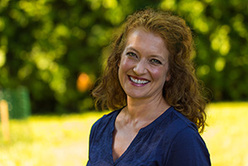
Jena Necrason, along with her husband John, founded the Vermont Shakespeare Festival in 2005. Ever since then they’ve brought Shakespeare to life with intelligence, wit and power-packed action! Read on to learn more about Jena Necrason and her artistic choices in directing this year’s production, Julius Caesar.
Can you tell me a bit about your history with theater?
I went to college and got a BFA in dance performance. Then when I moved to New York I started studying acting very seriously and I did that for a number of years. I lived in New York for 20 years working as a dancer, actor and movement teacher. I did a lot of Shakespeare. In 1997 I joined the faculty at the Stella Adler Studio of Acting, where I continue to teach and now serve as the Head of Movement.
Why start a Shakespeare Festival in Vermont?
There’s an amazing precedent all around the country for Shakespeare Festivals in almost every state. These festivals have a huge economic and cultural impact on their communities. Vermont is a state with tons of arts and culture and a lot of supporters of the arts, and we found that people really loved us doing outdoor Shakespeare. When we started we kept hearing “Please do more!” They kept coming back every year and wanting more. Also doing Shakespeare in the park in Vermont is really a beautiful thing because it is such a lush environment. It gives the artists a lot to work with and respond to when we perform Shakespeare outside in the open air.
Why this play, Julius Caesar? What interests you about it?
Julius Caesar is an incredible play; it’s a challenging play. It’s only the second tragedy that we’ve done and it’s based on a historical event that everyone knows. We chose the play about a year ago because 2016 is an election year and this is a play about politics and power. It’s a play about the nature of honor and virtue and nobility, and those things being at odds with moral ambiguity in the political arena. We thought it would be very relevant and connected to the landscape of what’s happening in our world right now, with how divided and chaotic everything is.
What scene are you most excited to work on from Julius Caesar?
Probably the “big event” in the senate. My husband John is the fight director on the show and he’s working with a room full of actors and weapons. The scene itself is dark. It’s disturbing. It’s challenging for the actors because there are a lot of technical aspects that go into staging violence of any kind. It requires specificity in the details of every single movement, breath, rhythm, and step that is happening.
Why did you decide to cast female actors in male roles?
We have cast female actors in the roles of Brutus, who is the leader of the conspirators, Mark Antony, who is the second in command to Julius Caesar, and in the role of Octavius Caesar who is Julius Caesar’s nephew who eventually becomes one of the triumvirate ruling Rome after Caesar’s death. I think it’s important to cast females in male roles because when you look at the cast of characters for a Shakespeare play, generally it’s about a 10 to 1 ratio in opportunities for males actors to female actors. We’re not the only theater company who has made this choice. A lot of companies and theatre directors have been focusing on gender blind or gender conscious casting, particularly with Shakespeare. So for me it was about giving more opportunities to female actors. In this production the females cast in these males roles are playing male characters. We haven’t changed the gender of the character, so we’ll see how the audience reacts to that. This is a chance for these female actors to play a character they’d normally not get to work on, and tackle lead roles that are usually not available to them.
Is this play appropriate for kids?
We’re recommending it’s for children 10 and over because there’s violence, and there’s blood, and parents have to make that decision for themselves. We always have a child friendly synopsis of the play available at the box office. I think if parents wanted to bring children that are younger they will just have to be aware of the violence and explain that it’s pretend.
What advice do you have for students who want to get involved in theater?
I would say get involved in a really great training program, study, study, study, really learn the craft of acting and get a solid foundation for your passion. I think going into the world of theater in any capacity- whether it’s as a performer, a technician, a designer, or the business side of making theater like producing, marketing, company management, or stage management- is a great career choice. There are tons of opportunities, but it’s definitely competitive and you have to work extremely hard to get work. You need really good training and confidence. You have to be confident in yourself and who you are. You have to believe that you have something to offer and that you have something to say as an artist.
Come see Julius Caesar outdoors this weekend at the Shelburne Musuem, July 28-30th at 6pm! The indoor showings will be held at the Royall Tyler Theater at the Unviersity of Vermont August 5th and 6th at 7:30pm, as well as August 7th at 2pm.